- Home
- Georgette Brown
Tempting A Marquess for Christmas
Tempting A Marquess for Christmas Read online
Table of Contents
Chapter 1
Chapter 2
Chapter 3
Chapter 4
Chapter 5
Chapter 6
Chapter 7
Chapter 9
Chapter 10
Chapter 11
Chapter 12
Chapter 13
Chapter 14
Chapter 15
Chapter 16
Chapter 17
Chapter 18
Chapter 19
Chapter 20
Chapter 21
Chapter 22
Chapter 23
Chapter 24
Chapter 25
Chapter 26
Chapter 27
Chapter 28
Chapter 29
Chapter 30
Chapter 31
Chapter 32
Chapter 33
Chapter 34
Tempting A Marquess For Christmas
by Georgette Brown
Table of Contents
Free Book Offer
Chapter 1
Chapter 2
Chapter 3
Chapter 4
Chapter 5
Chapter 6
Chapter 7
Chapter 8
Chapter 9
Chapter 10
Chapter 11
Chapter 12
Chapter 13
Chapter 14
Chapter 15
Chapter 16
Chapter 17
Chapter 18
Chapter 19
Chapter 20
Chapter 21
Chapter 22
Chapter 23
Chapter 24
Chapter 25
Chapter 26
Chapter 27
Chapter 28
Chapter 29
Chapter 30
Chapter 31
Chapter 32
Chapter 33
Chapter 34
Works by Georgette Brown
Copyright
Tempting A Marquess for Christmas
by Georgette Brown
Copyright © 2017 by Wind Color Press. All Rights Reserved.
Cover art by The Killion Group.
FREE BOOK
You won’t believe what this rakish nobleman proposes for a wager!
Get your FREE copy of An Indecent Wager
HERE
Tempting A Marquess for Christmas
Chapter 1
MILDRED ABBOTT WINCED as her mother emitted a wail of despair. She had no wish to cause her mother pain, but in this, her relief exceeded her guilt.
“You must speak to Haversham again,” Mrs. Abbott insisted.
But Mr. Abbott had settled into his favorite armchair before the hearth, and having done so, was unlikely to rise for some time.
“He has decided to depart for Scotland tomorrow.”
“All the more reason to speak to him before it is too late,” his wife said, her voice high and shrill with desperation.
Mr. Abbott shook his head. “It would do no good. It is not Haversham who must change his mind. It is Alastair.”
Mildred drew in a deep breath. Her cousin had done it. Though he had initially refused to intervene in the matter of her engagement, in the end he had brought about the result she had hoped for. She had erred in accepting Mr. Haversham's proposal, and only the Marquess of Alastair had the position and the influence to alter the arrangement without too much consequence falling upon the formerly engaged couple.
“Surely something can be done,” Mrs. Abbott persisted. “Haversham was partial to our Millie. I know it.”
“Apparently not enough to acquiesce to the marriage settlements required by Alastair.”
Mrs. Abbott wrung her hands. “I know not why the Marquess has decided to concern himself in this matter when he has never concerned himself with us before. Why now?”
“I suppose it is my fault for having approached him with a request for Millie's dowry.”
“Nevertheless, he is not the one who need marry Haversham!”
Millie suppressed a smile at the idea of her cousin marrying Haversham. The two men could not be more unalike. The latter was an obsequious dandy who had modest connections, the former was an arrogant and, many deemed, cold-hearted man of quality.
Mr. Abbott reached for his newspaper. “Well, as he is the one providing Millie's dowry, he has a right to interfere.”
Mrs. Abbott gave another wail. “Now who will have Millie? It is not as if she has a queue of men wishing to court her!”
Mildred took no offense at this, for it was true. Though there was much she could yet do to improve her appearance, she knew her beauty to be middling. She had neither soft tresses, long lashes nor the slender figure desired by most. She had other qualities that would serve a husband well, but there was a part of her that few would find acceptable.
Beneath her facade of sense and goodness, churned a dark and prurient nature. She had been much ashamed of this part of her until Alastair's aunt, Lady Katherine, had come across her in a compromising way. In agony that she might have ruined her family, Mildred had been greatly astonished when Lady Katherine had comforted her and, later, encouraged her.
It had been an immense relief to Mildred to find that she was not alone in her proclivities, and that these were shared by a woman whom she respected and admired.
“Now Millie will never marry!” Mrs. Abbott lamented as she sank to the sofa.
Mildred took a seat beside her mother and passed her a handkerchief to dab her eyes. Spinsterhood was not a prospect that daunted Mildred, save for the grief that her parents might experience. She was their only child, and as they had but the most modest of means despite their connection to Andre d’Aubigne, Marquess of Alastair, their only hope of seeing their daughter provided for was through marriage. For this reason, Mildred had accepted Haversham’s hand.
But regret had set in within minutes of her acceptance. That night, she had decided that she would rather face spinsterhood than marry Haversham. If a husband could not be had—she wondered that she could ever find the right man to marry—she would find employment as a governess or lady’s companion. She could appeal for assistance to Lady Katherine, who had taken a liking to her. She would secure her own future.
“I feel quite ill,” Mrs. Abbott said.
“Shall I assist you to bed, Mama?” Mildred asked.
“No, no. I am too aggrieved to move.”
“Millie’s dowry is still in place,” Mr. Abbott assured his wife without glancing from his paper. “Alastair has even raised the amount to four thousand pounds. I expect we will see more suitors than we care to entertain.”
Mrs. Abbott leaped to her feet. “Four thousand pounds! Truly? Why did you not speak of this first? Why, with such a grand sum, Millie can have much better than Haversham.”
Mildred sat, stunned. She had not requested this of Alastair, and she doubted that her father, who had been more than pleased with half the amount, would have dared request more than had been initially granted.
Mrs. Abbott practically danced about the drawing room. “I must tell Mrs. Porter of this! She will not believe it! At last, my brother’s marriage to a d’Aubigne has produced some benefit for us. I can almost forgive him now for his lack of consideration. He ought to have provided for the rest of us instead of keeping the riches of the d’Aubigne family to himself.”
Mildred said nothing, for Richard, Mrs. Abbott’s older brother, had passed away many years ago and was thus beyond receiving her clemency. And Mildred believed that her uncle, perhaps ashamed of his humble background, acted to protect the d’Aubignes from clamoring relatives.
; “Richard would have us believe that Alastair had not a generous bone in his body, but at four thousand pounds... Well, I suppose it makes up for his lack of attention to us all these years. It amazes me how little he has done for us. Millie is his cousin, after all.”
“By marriage, not blood,” Mildred reminded her mother.
“Oh! The difference ought not matter. I had hoped the two of you could have formed a bond as you are not so very different in age.”
Mildred flushed. Her mother could never know that, for one night, a special bond of the most intimate nature had been had between Mildred and Alastair, but not the sort Mrs. Abbott would have ever conceived.
Mildred pressed her legs tighter together as she recalled how delightfully the Marquess had attended to the flesh between her thighs with his tongue. And she, in turn, had taken his member into her mouth. How exquisitely naughty it had all been. How amazingly rapturous.
Mildred had tried not to recall too often her night at Château Follet, nee the Château Debauchery, when she had submitted her body to Alastair. But resistance was futile. It had been the most memorable event of her life. She had replayed every moment, and each recollection produced a heat inside of her. In the quiet of her bedchambers, she had fondled herself to the memories. She had found her own touch wanting compared to his, but she dared not dream for an encore. She still marveled that she had managed to harry him into taking her and fulfilling her most wanton desires.
She had resolved, despite Alastair’s belief to the contrary, that how they regarded and interacted with each other would be unchanged.
“You think our relationship can remain the same after what happened?” Alastair had challenged her the morning after their congress.
“Why not?”
“Your naivety is charming at best.”
“Well, we are not often in each other’s company,” she had replied. “The night will hold little significance for you after you have had a tumble with Miss Hollingsworth or whomever you choose next. I daresay you will have forgotten the night altogether after your next visit here.”
She wondered if he had forgotten, then told herself that of course he had. She was but one of many whom he, a known rake, had taken to bed, and had done so, undoubtedly, with reluctance.
“I wonder if we should invite Mr. Carleton to dinner?” Mrs. Abbott mused aloud. “I think he could be persuaded to take an interest in Millie, now that her dowry is the sum of four thousand pounds.”
“Mr. Carleton!” Mildred shuddered. The man was worse than Haversham.
“His family’s merchant business does very well, I understand.”
“He lobbied against the abolition of the slave trade.”
“He was not the only one, my girl. And do not suppose that you can disparage such prospects simply because you have a dowry of four thousand. Four thousand!” she cried, her voice shrill this time from glee. “Mrs. Porter had thought her nephew too good for the likes of Millie, but she will have to reconsider now that Millie has four thousand pounds!”
Mildred frowned. Mrs. Porter’s nephew, a portly fellow afflicted by gout and who disdained of bluestockings and the need for women to display their intelligence, was hardly a better prospect than Carleton. This would not do. This would not do at all. She saw a dinner table full of prospective suitors her mother had invited, hours upon hours of making polite conversation with dull-wits and no end to her mother’s efforts at matchmaking.
“But I think Mr. Winslow, her neighbor, may also take an interest in Millie. He had been courting Miss Bennett, but I heard she had taken a fancy to some dandy.”
“I thought Winslow to be courting Miss Stephenson,” Mr. Abbott commented.
“That was last year, shortly after he was courting Miss Drury. Or was it Miss Laney he had been partial to?”
Mildred leaped to her feet. “I think I shall go for a walk.”
“Alone?” Mr. Abbott inquired, looking up from his paper, perhaps fearing he would be compelled to keep her company, though it was her custom to take solitary walks.
“I may stop to visit Mrs. Bridges,” Mildred replied, regretting the necessity to fib. In truth, she intended to pay a visit to her cousin.
“Do not make it a long visit, as dusk will be upon you before you realize.”
“Yes, Papa.”
As she exited the drawing room, she heard her mother say, “Perhaps I shall take tea with Mrs. Elliott tomorrow. She has a sea captain staying with her. He is quite a bit older than Mildred, and his complexion reminds me of worn leather, but that is to be expected when one spends as many days beneath the sun as he must...”
Mildred threw on a pelisse, quickly pinned on her bonnet, and slipped on her gloves as she hustled out the door. It was no short distance to Grosvenor Square, where Alastair lived, but she was unafraid of walking.
She could not permit Alastair to increase her dowry to such an amount. It was beyond generous, a trait she—or anyone else—would not have expected to exist in the Marquess. What could have possibly prompted such a gesture from him? She doubted her father, who had been quite nervous at requesting a dowry in the first place and would likely not have done it if not for the prodding of his wife, would have ventured to ask for it.
But why would Alastair have volunteered to raise her dowry? Lest his aunt had persuaded him to? Mildred supposed this must be so. Lady Katherine had a kind heart and was partial to Mildred. She would have to thank her ladyship, but they simply could not accept so generous a dowry. Mildred shuddered to think whom else Mrs. Abbott had in store for her.
Mildred quickened her steps. Though she would rather not make any further requests of her cousin, especially when she had exacted quite a bit from him already, she simply had to convince Alastair to rescind the four thousand pounds.
Chapter 2
MILDRED SCANNED THE gaming hall looking for her cousin. She spotted him at the faro table flanked on either side by two beauties. The flaxen-haired beauty to his right leaned often toward him, her shoulder grazing his every other minute. The woman to his left had wide rouged lips, and the longest lashes Mildred had ever seen. She batted them at Alastair from behind her ivory-handled fan.
The attentions of the two women did not surprise Mildred, for the Marquess of Alastair had a striking, if not imposing, countenance framed by the d’Aubigne curls of ebony and all the qualities desired in form for his sex: a broad chest, square shoulders, and posture that accentuated his height. Though Mildred had not been struck at first by his handsomeness, for his eyes did not glimmer with charm and he did not often smile, since their encounter at Château Follet, she had come to find him compelling in other ways.
“Please let Lord Alastair know that his cousin wishes to speak to him,” Mildred informed the footman. She could tell the Marquess was engrossed in his game, for he paid the two women beside him little attention. Mildred would not be surprised if he should choose to ignore her request for an audience. His butler, in informing her of his lordship's whereabouts, had warned her that he would not wish to be disturbed. For that reason, Mildred had kept her bonnet and coat.
She drew in a sharp breath as she watched the footman deliver her message to Alastair. Her cousin glanced up from his cards, he seemed neither pleased nor displeased, and Mildred decided it mattered not if he should see her. If he declined, she could always write him a letter expressing her gratitude. Indeed, she wondered at the necessity in coming to deliver her thanks in person. She wondered at her own eagerness. Had it been simply an excuse to see him?
The footman returned, and Mildred braced herself to receive the news that the Marquess was indisposed, but the servant said, “If it pleases you, miss, you may await his lordship in the parlor down the hall.”
She released the breath she had been holding and answered, “Yes, of course.”
She followed the footman to the parlor. After he had left her alone, she sauntered about the small but nicely appointed room. She had not the patience to sit upon the sofa in the middle
of the room. Why, of a sudden, did she feel nervous? It was silly. She was merely going to thank him.
She had only felt such nerves one other time with her cousin. It was the night she had approached him at his aunt Katherine's birthday to request his assistance in getting out of her engagement with Haversham. She did not often find him as intimidating as others would.
But there was no denying that the nature of their relationship had changed since that fateful night at the Château Debauchery. Not only had she lifted her skirts to him, she had done so in the most wicked and wanton fashion.
To keep her mind from straying into the past, she studied the baroque longcase clock in the corner, wandered to the hearth to warm her gloved hands at the fire, and viewed herself in the looking glass above the mantel. She was glad she was comely enough such that Alastair had capitulated to her desires. She had fancied that perhaps he had even desired her a little, enough to be aroused, though she had heard that his sex required little in the way of arousal and could be titillated by the prospect of congress with any woman, even if she was not the most striking.
“What is amiss?”
She whirled about to face her cousin. Now that he was in closer proximity, he appeared more imposing. She tried not to recall how strong and heavy his body had felt against her.
“Nothing,” she answered, gratified that his voice had carried more concern than was his custom.
“Then why are you here, Millie?”
Now he sounded displeased.
“I came first to thank you,” she said, refusing to be intimidated by his mood. “Father said that Haversham departs for Scotland on the morrow.”
“Good riddance. May I suggest that you pick your next husband more carefully?”
“Of course. I rather think that I shall not be accepting any more proposals for some time.”
He made no reply, and she suspected that he desired to return to the card tables, but she could not leave without addressing her other request.
“I would have written a letter to express my heartfelt thanks, but I was uncertain when it would reach you, and I did not think that it would have adequately communicated the sincerity of my gratitude.”

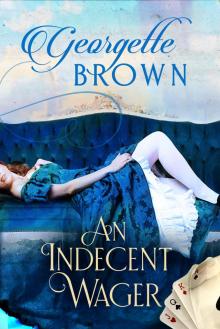 An Indecent Wager
An Indecent Wager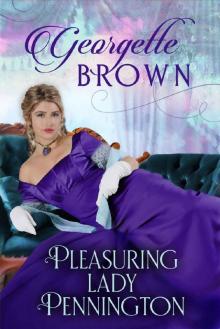 Pleasuring Lady Pennington (A Super Steamy Regency Romance Book 6)
Pleasuring Lady Pennington (A Super Steamy Regency Romance Book 6)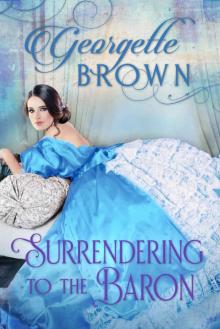 Surrendering to the Baron (A Steamy Regency Romance Book 7)
Surrendering to the Baron (A Steamy Regency Romance Book 7)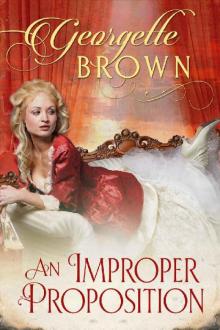 An Improper Proposition (A Steamy Regency Romance)
An Improper Proposition (A Steamy Regency Romance)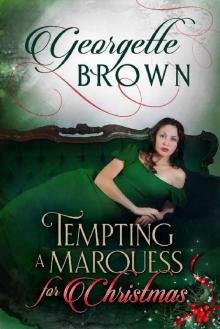 Tempting A Marquess for Christmas
Tempting A Marquess for Christmas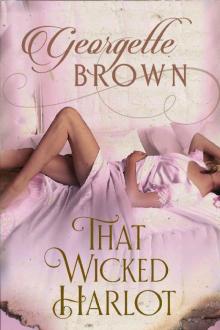 That Wicked Harlot (A Steamy Regency Romance Collection Book 2)
That Wicked Harlot (A Steamy Regency Romance Collection Book 2)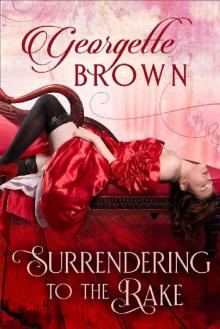 An Indecent Wager: A Scorching Hot Historical Romance (Super Steamy Regency Collection Book 1)
An Indecent Wager: A Scorching Hot Historical Romance (Super Steamy Regency Collection Book 1)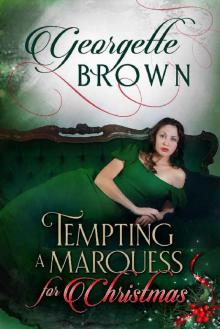 Tempting A Marquess for Christmas: A Steamy Regency Romance Book 5
Tempting A Marquess for Christmas: A Steamy Regency Romance Book 5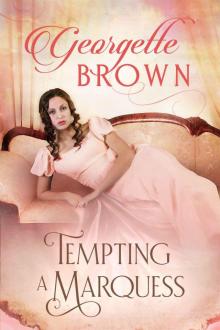 Tempting A Marquess
Tempting A Marquess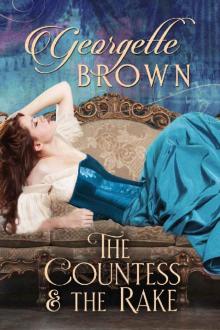 The Countess and the Rake: A Super Hot Historical Romance
The Countess and the Rake: A Super Hot Historical Romance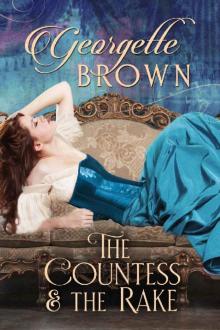 The Countess and the Rake
The Countess and the Rake